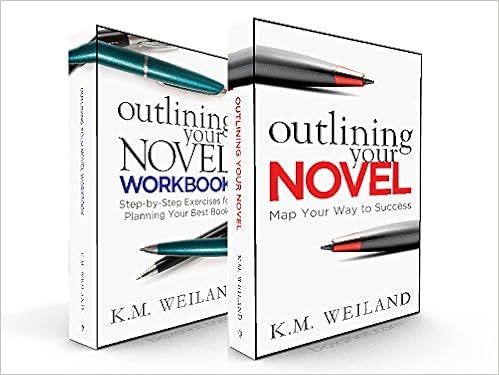
Mom was right. Life’s not fair.
One of the best and worst parts of being an author is how many people bring you their work and say, “Can you tell me what you think?” I’ll be brutally honest. I hate it. I want so badly to stick my fingers in my ears and sing “How Great Thou Art” and hope they think it’s about them or something.
Look, I’m a writing snob. When I say that, I need to do a couple of caveats. First, just because I’m a writing snob, doesn’t mean I think I’m the only one who can write worth beans. I’m well aware of my many writing faults. I work constantly to fix them. But let’s face it. You can spot it much more easily in someone else’s work than you can in yours.
So when people bring me a manuscript and beg me for an opinion, I always try to do it. And I always say, “Please do not ask me for my opinion if you do not want it. I will be as kind as possible, but I’ll be honest. And sometimes honest hurts.” I do this because I didn’t know I needed to in the beginning and I learned quickly that when a LOT of people say, “Will you give me your opinion?” what they really mean is, “Will you tell me what a writing genius I am?”
So not fun.
Sunday night, I was working at Denny’s (where I am now, in fact). Shocker, I know. The chef came over. He’s told me about his books before, but he’s stumped with a spot and wanted help. Here’s where things got interesting.
- His book is about vampires, witches, and werewolves. Need I say more?
- He’s looking for a way to make a horrible scene happen. Seriously awful stuff.
- He’s not thinking horrible enough.
No joke. He’s telling me what he wants to happen, and he keeps trying to do it too nicely. I remember it feeling a bit surreal–almost an out of body experience. I described the scene he needed. Folks, it was BRUTAL. I mean, it was so horrifying, I don’t even know how I came up with such a nightmare. It’s the kind of thing that if I saw it in a movie, I’d turn it off or walk out. It makes Steven James’ stuff look tame.
I blinked. Twice. He winced. You could see it in his eyes. He knew it was good–it’s what the story needed–but man, he didn’t want to do it. Me, I just tried to imagine the abject horror on all of your faces if you could hear me spouting this terrible scene idea.
Now there’s something you should know about Mr. Chef. He’s already told me the entire story arc–in minute detail. I’ve learned that most of the time when people can tell it that well and in that much detail… they can’t write it. They’re the kind of people who need to dictate into a text-to-speech program or they’ll never get the words out.
He showed up at my table a little while later–big black leather journal in hand. He’d handwritten every. single. word. of the prologue (it needs to be titled chapter 1 btw. Most do–or cut. Most need to be cut. Most of what is left should just be chapter 1. Just sayin’. His is no exception). Anywho. He asks if I can read it. I wince. I want to cry. Scream. Run.
Instead, I said yes. Yes–with a caveat. I said, “As long as you really want the truth. I’m not going to tell you what you want to hear.”
He insisted that he did. And frankly, I didn’t believe him. The look on this guy’s face screamed, “Don’t destroy my dreams!”
I went into it confident of three things.
- I would find tons of passive writing. There always is. For those who aren’t confident about what I mean, I’ll oversimplify it. “John was walking to the store when a big dog started attacking him.”(passive). Vs. “As John sauntered down the sidewalk in his quest for a Hershey’s bar at the store, a doberman leapt from the bushes and mauled him.” (active)
- I would find lots of telling rather than showing. The above example shows the difference there as well. But, I’ll do it again. “John ate the candy bar.” (tell) Vs. “Chocolate dribbled down John’s chin as, square by square, John devoured the Hershey bar.” (Show). Note: both of those are bad examples, but I’m tired, it’s late, and I’m still suffering from “Life’s not fair” syndrome.
- I would find massive numbers of dialogue tags. This is where every line is preceded or followed (usually followed) by “said John” or some equivalent. So the narrative goes like so. “Are we going to the store?” asked John. “Sure,” agreed Jane. “Well, let’s go down Market Street,” suggested John. “Last time I went to the store, I got mauled by a doberman on West Avenue.” “Okay,” agreed Jane. *insert banging head here*
So I read. When he said he can’t spell, he wasn’t joking. But really, half of it was word choice stuff–like saying someone was pail instead of pale. Not horrible except that Word won’t help him fix that, unfortunately.
I found almost no passive writing. Almost none. And really, when there is almost none, it isn’t the end of the world that there is some! I found very little telling instead of showing, and when I did find it, most of it was because telling in 3 sentences what it would take three pages to show was a kindness to the reader. I found almost no dialogue tags in the “prologue.”
Is it evil that I sagged in relief when the chapter had a bunch?
Before I tell you the next part, I have to give background he gave me.
- English was his worst subject. He hated it.
- He doesn’t read much.
The grammar–not a problem. Seriously. I didn’t see any verb/tense agreement issues. I didn’t see the non-parallel phrase issues I had. I didn’t see anything that jumped out and said, “This’ll take work.” You know that “life’s not fair” thing? Yeah. That.
Aside from those aforementioned dialogue tags and misspelling, the only real issue I found was the tendency to describe a bit too much. You know, that thing that I thought meant he might not be able to write?
 The guy is a seriously good writer. He has a compelling story idea. It’s not my genre. I’d normally never buy it, but he is just that good. I’m thinking, WOW. I want to see what he does with it. Oh, and get this! It may have been in there. I was so focused on looking for things he needed to stop doing before they became ingrained bad habits that I could have missed it, but he didn’t have much if any foul language. It was pretty clean. Not what I expected from vampires/werewolves/witches. You know? For the record, I gave him a set of K.M. Weiland’s workbooks to help him along–thinking about stuff. I just don’t know if he needs them. *gulp*
The guy is a seriously good writer. He has a compelling story idea. It’s not my genre. I’d normally never buy it, but he is just that good. I’m thinking, WOW. I want to see what he does with it. Oh, and get this! It may have been in there. I was so focused on looking for things he needed to stop doing before they became ingrained bad habits that I could have missed it, but he didn’t have much if any foul language. It was pretty clean. Not what I expected from vampires/werewolves/witches. You know? For the record, I gave him a set of K.M. Weiland’s workbooks to help him along–thinking about stuff. I just don’t know if he needs them. *gulp*
I was really impressed–scary impressed.
And a little jealous, if I’m honest.
Yeah. Mom had it right. Life’s not fair. 😉


I would be horrible at this. One of my pet peeves, besides using incorrect forms of words (like your “pail/pale” example, and my all time favorites of “two/too/to” “your/you’re” and “their/there/they’re”) is when the author doesn’t stay true to the era in which they’re writing. Seriously, a western set in the mid 1800’s would not say to “Ms. Molly” that her cherry pie was “totally amazing”. Now, “Miz Molly”, on the other hand, has a cherry pie that is “mighty tasty”…. Call me crazy. Call me a snob. Tell me that unless I am an author, I shouldn’t criticize. I truly appreciate authors who understand this. Thanks for being truthful. For being a consistent writer! And for not making the chef mad. Never upset the person who cooks your food if you can avoid it!?
Totally hate it. It’s just. BLECH.
Wanna know what’s weird. When you try to use a phrase, AS IT WOULD HAVE BEEN, and can’t because it SOUNDS modern. “You have the coolest yard in town.” Had to take that out of Madeline because of the modern use of “cool.” Also, “snarky” was slang back then. But it’s used again now, so it doesn’t work to use THEIR slang! So weird.
LOL. That’s totally not where I thought this post was headed. While I’m not a fan of that genre, either, I hope he’s able to follow his dream!
That was such a fun story to read! Thanks for sharing!
Tina